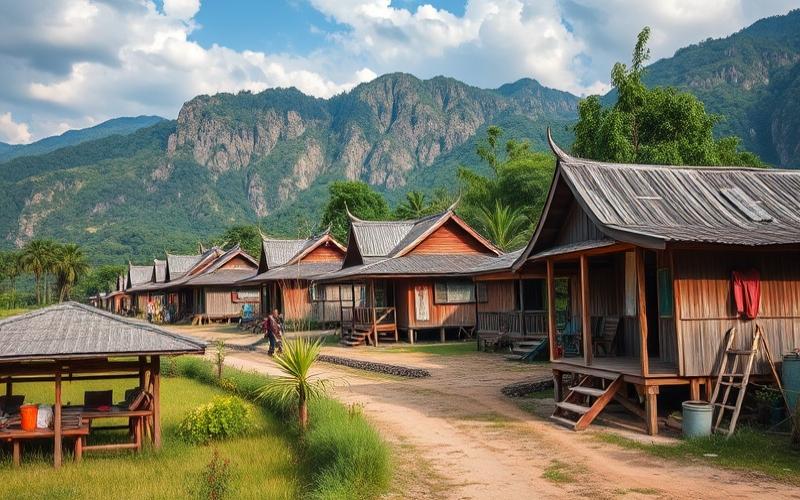
 Published on and written by Cyril Jarnias
Published on and written by Cyril Jarnias
Thailand, with its dream beaches, rich culture, and affordable cost of living, attracts many foreign investors looking to purchase real estate. However, the buying process for non-residents involves certain specificities that are essential to know before getting started. Here is a detailed guide to help you navigate the complexities of real estate investment in Thailand.
Keys to Becoming a Property Owner in Thailand
Contrary to some misconceptions, it is entirely possible for a foreigner to acquire real estate in Thailand. However, the legislation imposes certain restrictions that are important to know:
- Foreigners can freely purchase condominiums in co-ownership buildings, provided that the total number of units owned by foreigners does not exceed 49% of the building’s total floor area.
- Purchasing land or individual houses is more complex. Foreigners cannot directly own these types of properties, but there are alternative solutions such as setting up a Thai company or obtaining a leasehold agreement.
- Foreigners married to Thai citizens benefit from more favorable conditions for acquiring real estate.
Good to know: Although these restrictions may seem limiting, many foreign investors successfully acquire properties in Thailand using appropriate legal structures. It is crucial to work with competent professionals to navigate this complex legal framework.
Real Estate Taxation: What You Need to Know
Taxation is a crucial aspect to consider when purchasing real estate in Thailand. Here are the main elements to know:
- Registration fees: Typically amount to 2% of the property’s appraised value.
- Stamp duty: 0.5% of the property value or lease amount, as applicable.
- Specific business tax: 3.3% of the appraised value or sale price (whichever is higher).
- Income tax: Rental income is taxable in Thailand. The rate varies depending on the amount received.
- Capital gains: Upon resale, a capital gains tax may apply. Its calculation is complex and depends on several factors.
Good to know: Thailand has signed tax treaties with many countries, including France, to avoid double taxation. It is recommended to consult a tax expert to optimize your situation.
Purchase File: Essential Documents
To successfully complete your real estate purchase project in Thailand, you will need to prepare a file containing the following documents:
- Valid passport
- Long-stay visa or work permit (if applicable)
- Proof of income and/or assets
- Bank statements from the last 6 months
- Marriage certificate (if married to a Thai citizen)
- Documents related to setting up a Thai company (if this option is chosen)
Good to know: All foreign documents must be translated into Thai by a certified translator and legalized. This process can take time, so it is advisable to start early.
Key Steps in Real Estate Acquisition
The real estate purchase process in Thailand generally unfolds as follows:
- Property search and price negotiation
- Signing a reservation contract and paying a deposit
- Due diligence (thorough verification of the property and its legal status)
- Signing the definitive sales contract
- Payment of the balance and property transfer
- Property registration with the competent authorities
Good to know: It is highly recommended to hire a specialized lawyer to assist you throughout the process. This will help you avoid many pitfalls and secure your investment.
Financing Your Purchase: Available Options
Financing a property in Thailand can be complex for foreigners. Here are the main options to consider:
- Self-financing: This is the simplest and most common solution for foreign buyers.
- Local bank loan: Some Thai banks offer loans to foreigners, but the conditions are often restrictive.
- Developer financing: In the case of off-plan purchases, some developers offer payment facilities.
- International loan: It is possible to obtain a loan in your home country to finance a purchase in Thailand, but this option can be costly.
Good to know: Interest rates in Thailand are generally higher than in Western countries. It is important to carefully compare different financing options before making a decision.
Good to know:
Investing in real estate in Thailand can be an excellent opportunity, but it is crucial to do thorough research and work with competent professionals. The legislation changes regularly, so it is important to stay informed about the latest regulations in force.
Disclaimer: The information provided on this website is for informational purposes only and does not constitute financial, legal, or professional advice. We encourage you to consult qualified experts before making any investment, real estate, or expatriation decisions. Although we strive to maintain up-to-date and accurate information, we do not guarantee the completeness, accuracy, or timeliness of the proposed content. As investment and expatriation involve risks, we disclaim any liability for potential losses or damages arising from the use of this site. Your use of this site confirms your acceptance of these terms and your understanding of the associated risks.



















































